Obviously, I am not every Muslim woman’s story nor am I a benchmark. But there are many like me who hang this most controversial piece of cloth on their face, unflinchingly and unapologetically. Those who aren’t smothered, oppressed or chained behind that veil. It is just a part of our identity and our informed choice.
We are not a piece of fabric. An extra layer of clothing does not make us any better than an unveiled woman (That’s Allah’s dominion). It is just how we manage our own spirituality and connection with our Creator…
So it shouldn’t be assumed that we are entrapped in some suffocating cloak and need to be saved. Not all of us need to be liberated by removing our coverings. It is rather a very uneducated misconception and can lead to robbing someone of their personal choices. Your saving us without truly knowing our story will cost us our freedom. We have a right and every ability to make our own decisions.
People generally don’t get to know much about it from somebody who wears it. They haven’t lived it or even befriended one with it. They know about it from people who talk about it, what is presented on media or judge it from outside that boundary. Ignorance can breed fear and even worse, contempt. So it’s good to ask questions from women who wear niqab to clarify your doubts instead of automatically assuming something based on the public opinion on the matter!
![]()
Some are enraged there even has to be anyone like us here at all. But we’re here, and we’re not going anywhere. We’re not the only one. People may call us extremists, but we are not affected by the pebbles that they throw from their mouths. We will be as polite as we can be, but we won’t be sorry for it. Sorry for who we are. We’ll keep shining bright, even if the shining light of our gemstones won’t be white.
Frequently Asked Questions about niqab:
How do people recognize you when you’re walking down the street?
Why men just don’t bother about wearing niqabs?
Should we all hide ourselves to make Allah happy? Would clothes influence the love of Allah?
Can you see/hear with your niqab on?
Do you have hair underneath?
Don’t you get hot in the summer?
Did your husband/father/brother tell you to wear it?
Only married women wear it, right?
My heart is pure, why should I wear hijab or abaya or niqab?
How do you manage wearing it at home?
How do you eat?
Covering your face isn’t necessary, so why do it?
Necessity is a fiqhi issue (which we are not qualified to answer) – some Islamic scholars say it’s obligatory, some say it’s recommended, some say it’s optional. But we do it because we want to emulate the best of women who were promised Paradise. Also, hijab comes with restrictions like no make up etc. And niqab makes it easier (for eg: if you’re wearing a lipstick). And we’ve found many personal benefits in it while shifting from hijab to niqab. It made life easier in one way. Just a personal experience though. For some, life becomes harder, but they feel closer to Allah with it, so they keep it.
Why do some Muslims wear it and other Muslims don’t?
Personal choice. Free will.
Do you shower with it?
No. Washing the face while also washing the niqab will be quite a time-saving hack though.
Do you sleep in it?
No. Unless the nose is freezing, then we’d love to use it as a heating system.
Why is your English so good?
It can be improved though 🤷🏽♀️
How do you interact with society with a covered face?
In an age of social media, mobile phones, digital transmission etc., all of us are navigating this digital world without it anyway.
Why is hijab not enough for you?
It was enough for us for a long time, until we wanted more. Until we longed for a better connection with Allah – a better reminder for ourselves – to think twice about our words and actions because we are now representing a minority within a minority.
Do you have to wear it though?
We don’t have to. We choose to.
So are you a Muslim?
Yes. Loud and clear. Alhamdulillah.
Your words are not more important than your smile. So why hide it?
Our words actually ARE more important than our smiles. If we have nothing nice to say, of course a smile is better, but we have plenty of kind words to speak so we will always use them beyond the smile.
Why do you buy clothes apart from your gowns etc.?
We buy the clothes we like – whether they are fashionable or no. We feel liberated from all the superficial expectations foisted upon our gender.
Who would niqab a flower or a tree?
We’re neither flowers nor lollipops
We’re neither pearls nor trees
We’re human beings with choices
And none can liberate the free 🦋
How do you breathe?
Inhale and exhale. Inhale and exhale. Repeat.
Do you have the same questions? Or more? Feel free to ask below and let’s understand each other! 👇 (no fiqhi questions please, because we are not scholars – we can only answer questions that are based on our personal experiences).
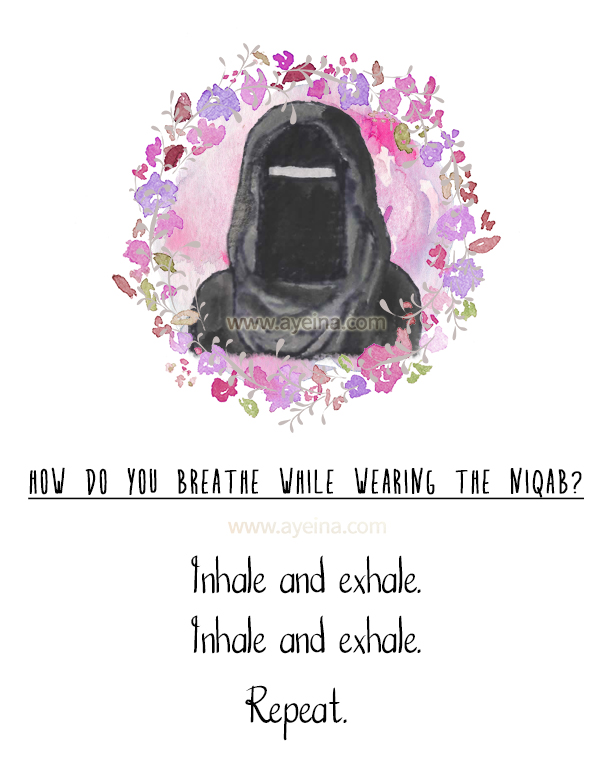
Feel free to download this art print from #AlhamdulillahForSeries to show diversity in Islam and how we can all coexist <3 Please tag us if you happen to print it out or post it on social media 🙂 Facebook, Instagram, Twitter
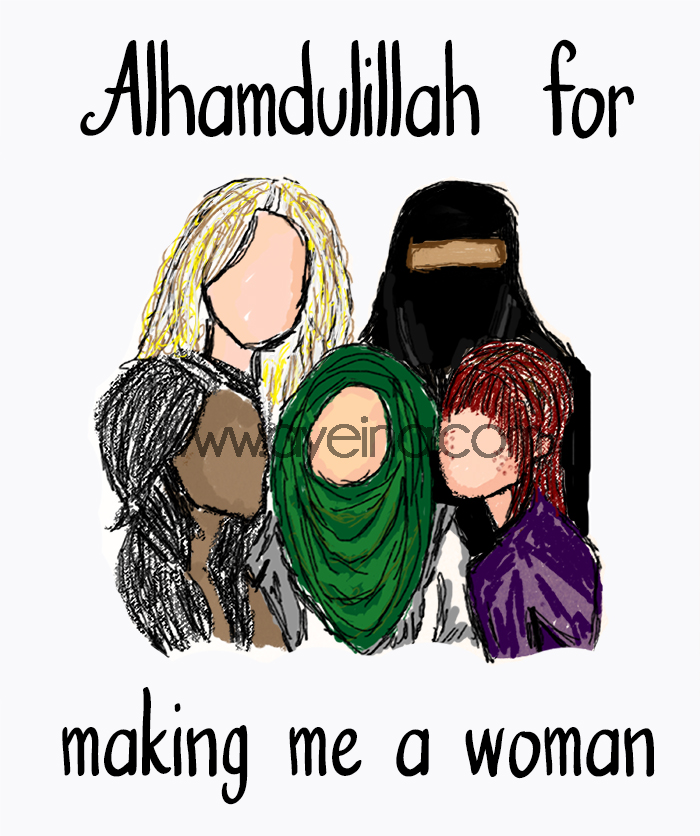
UPDATE:
We’re seeing our illustration (one as a featured image) going viral. This has been happening since long! and we’ve been ignoring the fact that no one is crediting the original source (and some even went to the extent of removing the logo and site name from the image) but recently, we’re seeing it being misused A LOT. Hence causing A LOT of negativity around niqab and Islam. Which is NOT OK! This is what happens when you don’t link back to the original source – people start to take it out of context!
This illustration is an experience of niqabis themselves. It’s not instructional. It’s the answers to some of the questions we get as niqabis all the time.
Questions like:
Do you dress like that at home too? You wear that in front of your father too? Do you cover even in a non-Muslim country? Would you doll up in a wedding where there are men too? Who is allowed to see you? So we simply illustrated how we usually go about in our day to day lives.
The illustration is simply to raise awareness of how our own choices form the basis of how we dress in different scenarios!
And whoever posted it without the whole article we wrote on it, completely missed the point.
The problem got even worse when accounts with HUGE following, handled by men, started posting it as an instruction. It escalated the same problem we are trying to solve here. We do not cover our faces because of patriarchy. It is OUR OWN CHOICE. Not dictated by a man. And when niqabis post it (even without giving us the credit), we are fine with it because at least the message is not being distorted. But if you are posting it as an instruction or to show yourself better than the others, it’s NOT OK! Not at all. Please don’t burn the bridges we are trying to build here by presenting unoppressed-narratives by niqabis themselves.
If you see the image around, please direct them to this original post, so it is not taken out of context (causing so much negativity) in shaa Allah.

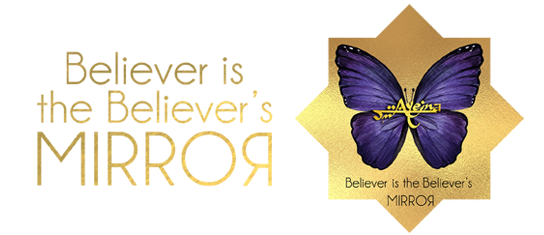


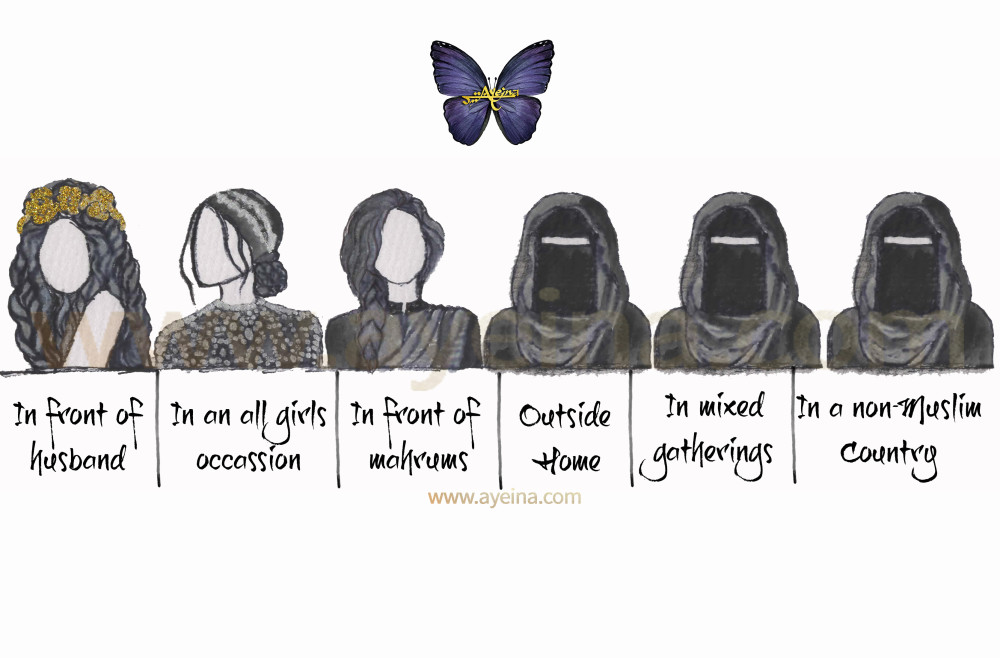
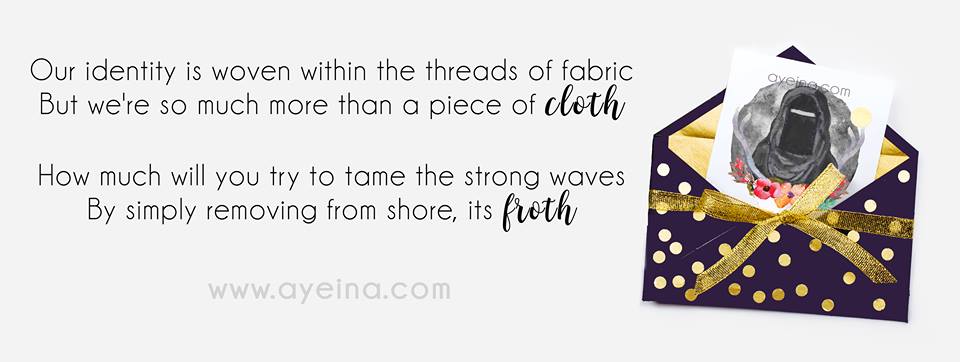
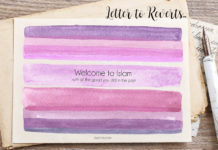
MashaAllah the niqaab or faceveil in Islam I believe not only proves how much love a Muslimah has for Allah and His noble Messenger Muhammad SallAllahu ‘alaihi wa sallam but it also allows others to be in touch with you through your personality and speech rather than just judging your physical appearance. I’ve written a poem about the beauty of niqab on my blog if you’d like to read it you are most welcome sisters in Islam 🙂 JazakAllahu khair for sharing your Islamic knowledge 🙂
Wasalaam from a niqaabi sister too from the Philippines 🙂
JustSharingIslam
Jazakillah khair for your kind words. Do share your poem with us. We’d love to read 🙂
If covering face was mandatory then why women have face uncovered during Hajj? Can you give reference from Quran where it says that only eyes can be exposed and rest has to be covered?
I must rephrase…(excerpts from the article/interview)
Obviously, I am not every Muslim woman’s story nor am I a benchmark…
An extra layer of clothing does not make us any better than an unveiled woman. Most of us choose to wear niqab because it is a Sunnah. It doesn’t mean that we consider it obligatory; nor does it mean that we consider those who do not wear the niqab, less chaste or modest. It is just how we manage our own spirituality and connection with Allaah 🙂
JazakAllaahu khair Annie for your keen interest. May Allaah bless you with the ilm and hikmah.
Like i said that islam can perfectly be understood through quran, sunnah and the way of the salaf. Scholars have differed on this with ample and authentic evidences with both sides. Few say it’s obligatory and few term it as sunnah.
If you want to read i detail about this and couldn’t find it, i will be more than grateful to help 🙂
As’salamo alykum
It’s such a wrong concept that women’s ahraam doesn’t allow to cover face…Hazrat Ayesha r.a. did cover her face whenever she was in presence of na mehrums during hajj/umrah…only difference is that today population of the world is so much increased that it’s impossible to be in na-mehrum-free zone even during hajj/umrah…but this doesn’t mean women are allowed to remain without pardah…according to Saudi fatawa committee only such a cloth isn’t allowed that’s made solely for the purpose of niqab…but following the example of Mother Ayesha r.a. v have to cover our face using our headscarf/chaadar etc. anything that’s not made solely for niqab purpose
Using the example of not allowing to cover your face during hajj is actually a really weak argument. There are so many things in hajj and umrah that men and women are not allowed to do. Like men are not allowed to wear trousers or shirts during hajj, yet they wear it outside of hajj. You’re not allowed to hunt/intercourse/clipp nails/pull hair out – but all these things are allowed outside of hajj.
To answer the question asked in comments, what I’ve learnt so far:
“Surah Noor and Surah Nisa (if I’m not mistaken) contains Orders of covering. One contains orders which allow a woman to not cover her face, wrists and feet. This is actually in front of all Mehrams, i.e., brother, son, father etc. The other Surah Orders to cover in full, and that is what addresses the situation when a woman goes out of her house, or is infront of a non-Mehram.”
And to re-iterate, its “obligatory” from ALLAH, much like Namaz and Zakat, as I’ve understood it.
JazakAllaahu khair muslim for your feedback….
Indeed islam can perfectly be understood through quran, sunnah and the way of the salaf. Fuquhah have differed on this with ample and authentic evidences with both sides. Few say it’s obligatory and few term it as sunnah
lovely post and loved the photos/hijjab art
Thank you marina. If you see it around, don’t forget to tag us 😀
Although brought up in Saudi Arabia, I have nearly never worn the niqaab, mainly because it isn’t followdd in my community.
The words, illustrations and sicussion above makes me want to start soon, in shaa Allah
Discussion*
You start it when you’re ready and when you choose to do so 💜 it will help you stick to it in the long run as well 🙂
As a fellow Niqab wearing woman and not trapped behind that piece of cloth I agree to every word that ou have written. I like people to me know me this way. Rather than putting my face out there I want to be known for my words!
Didn’t know you were a niqabi as well ❤ oppression would be to force ourselves to look a certain way just to keep everyone happy…
I have question, I’m planning on being niqabi and so I was wondering is it necessary to wear a burka out side or can u wear a long dress?
An abaya/burka is basically for super duper ease! It gives me the freedom to wear anything underneath and buy any sort of clothes that I like. and if i have to go outside, i can simply put on an abaya! instead of changing my clothes to something long, loose, simple etc. You can wear a long dress of course as long as it meets the criteria of hayaa and no-tabarruj. Rest, you may consult a scholar as I’m not qualified enough to answer such questions 🙂 best of luck habibti! you got this! <3
I hate how there’s an assumption that just because you’ve covered your face that your being oppressed. Some of us just prefer to cover. Beautiful post as always 😊
True. Some of us prefer one way over the other. Alhamdulillah for Islam that gives such freedom of choice 💜
You are right, most don’t know about it from those who choose wear it. And, it is a *choice*.
Rather they form personal opinions stemming from ignorance or biases based on the norms of the community in which they live or socialise.
May Allah grant us proper understanding and more tolerance towards the beliefs of others.
Aameen. Most of the people still think that women can’t choose this themselves and must be forced into it somehow…
We need more diverse voices – voices of niqabis themselves – so people can know that most of the times, it’s actually a choice!
I think it’s a shame the image has been misused so much. I’ve seen it been touted completely out of context and it was really disappointing because it just led to so much fitnah and arguing back and forth in comments etc.
I used to read comments on them first but then I gave up. We still keep on getting tagged by different people, showing us how it’s been used around :/ even now…kind of immune to it by this point…
The great ignorance & misconception about hijab and more especially the niqab continues to baffle me. And you are so right, people never ask about it from those who use it. Education and spreading awareness is the best way forward. May Allah bless your dawah effort.
Jazakillah khair amina. And yes, spot on! Our lack of awareness can scare us off from things that are completely harmless.
Masha Allah sister lovely post ❤️❤️
Why was the niqab introduced in the first place?
Why is it only for women?
Modesty in Islam is not just about the outlook: modesty is in the heart, in the dress, in the words, in the gaze, in the gait! Which is why modesty in Islam is not only confined to women but also extends to men. Modesty in gaze has been ordained in the Qur’an upon men before women.
It is a choice for those who want more spiritual experience and connection with their Lord because they want to emulate some of the greatest women in Islam who inspire them deeply. The definition of it can differ for different Muslims. Some feel modest in full clothes. Some feel modest in simpler clothes. Some feel modest in hijab while some feel modest in niqab.
By the end of the day, it’s a choice for many of us.
If you have any more questions, feel free to ask. We welcome healthy discussions.
But its only women who wear the niqab. So is it just a coincidence that the only people who feel ‘modest’ in the niqab are women?
This modesty thing clearly falls more on women than men – whether you are talking about the niqab or the hijab.
From a western point of view the niqab is positively scary. The only people in our societies who covered their faces were criminals. Its a sign of evil, of no good in our culture and so it makes people fee very uncomfortable.
It also looks like a prison for the woman concerned. Notions of humility, modesty are wonderful. But to have a woman covered from head to foot seems to deny her very humanity. If God had wished us ti hide away unseen by the works he would have not bestowed on us a face and the ability to communicate.
It is made even more onerous by it being applied only to women. This is one sided and so is unfair on women.
My mother – who is 77 years old and fought all her life along with all women in our society to gain equality with men and who slmost died because she fell pregnant after being warned by doctors that another child would kill her because my father would not sign the papers for her sterilisation even though he knew the risks. In the 70s men had that power even in the UK and my father was mean minded and jealous. She almost died.
So when she sees – as she does sometimes in out home town – a Moslem man walking down the street in western clothes, his children with him, in western clothes and his wide a couple of paces behind covered from head to foot – she says she feels like going up to him ad kicking him. To women like her who went through what she did, the niqab is a disgrace. The uneven treatment of women in this way is a disgrace. If they want to cover then let the men cover too – to impose this on women alone in such a stark way as the example I just gave – it goes against every advance in human rights we have literally shed blood in our country to achieve.
I respect your mother’s stance on freedom of choice for women. And niqab is just that for me and many other women around the world who actually had to go through opposition just because they chose the niqab-life for themselves because they wanted to – against all odds. I hope nobody tries to kick our already reluctant husbands after all the fights we went through with them to convince them that the world would not blame them for my personal decisions – my freedom – my choice.
I understand your husbands. I would be very much against my wife wearing the niqab for the reasons I mentioned. You are very lucky you have the choice. Most dont. For women in many countries there is no choice whether it is the niqab or the hijab. That is one reason why although I would not deny women the choice to wear the hijab in public because that would go against the freedom of choice we value, I do regard it as in poor taste given that for many more women around the world who are forced tonwear it it is therefore a sumbol of oppression. It will not stop being such a symbol until all of those women have the choice that you have too. My sympathies lie with those women first because they are denied choice.
David,
I appreciate that you asked a question to clear a confusion rather than form an opinion.
Your sympathies with the women who are denied a choice in this matter is completely valid. There is no compulsion in Islam, and that is the very first thing one should know. Parents, siblings, spouses, family members, and friends have an obligation to teach religion to those around them and under their care, and even encourage them, to guide them to this path when they are younger or when they might be going astray, but they have not been given the right to enforce it, especially in the case of women, (and a married woman is even more independent in Islam). A person’s belief, their obligation to their Creator is their personal matter. Allah does not allow another person to force belief in you. Yes there are matters in which permission is given to interfere and enforce, to establish ground rules for the safety and well being of a community as a whole, we know that as police work and the judicial system, etc.
Anytime you see a woman being oppressed, its because the people around her have not studied their religion properly and do not have the correct knowledge. So the problem does not lie with the hijab, but with what some people think it means (this can include the husband, father, brother).
I chose the hijab and niqab of my own free will, I go to school with it, I work with it, I go hiking with it. I am a successful woman with a family, children, a job, a business, and the independence to make my own decisions, to divorce, to remarry, to have children or not, to work or not, to work and have no obligation to share my money. I am the opposite of oppressed.
I just want to ask for some opinions..
Firstly, let me make it clear that no one in my family forces me to do so. My mum and husband in fact are againt the idea of me wearing the niqab.
I really want to wear the proper long jilbab. I always yearn to wear only black jilbab and plain abaya. I would like to wear the super long jilbab that covers until my shin and niqab that covers almost everything and shows only a very small portion of my eyes so that I can see. If possible, I would also like to wear the niqab with the eye veil. For now, I only wear the half niqab. And also not forgetting gloves to cover my hands. I just feel complete and secure wearing like this.
However, I still don’t have the courage to cover fully because I’m a working woman and at the same time I’m so scared that people might think I’m a terrorist. Can somebody please advise me on this dilemma?
Assalam u alaikum sis. What people think doesn’t change who you really are! With pandemic, most of us are actually covered from head to toe for protection so there is better acceptance for people who cover for religious reasons. If your heart is inclined towards it, go for it sis! because it’s so hard to live a life that your heart doesn’t agree upon. May Allah help you find peace and barakah in your decision.
Solehah it breaks my heart that you have to be fearful. I wish people would only judge others based on their actions and words, not their clothes and appearance. I hope whatever you decide you are treated with kindness and respect Xxx